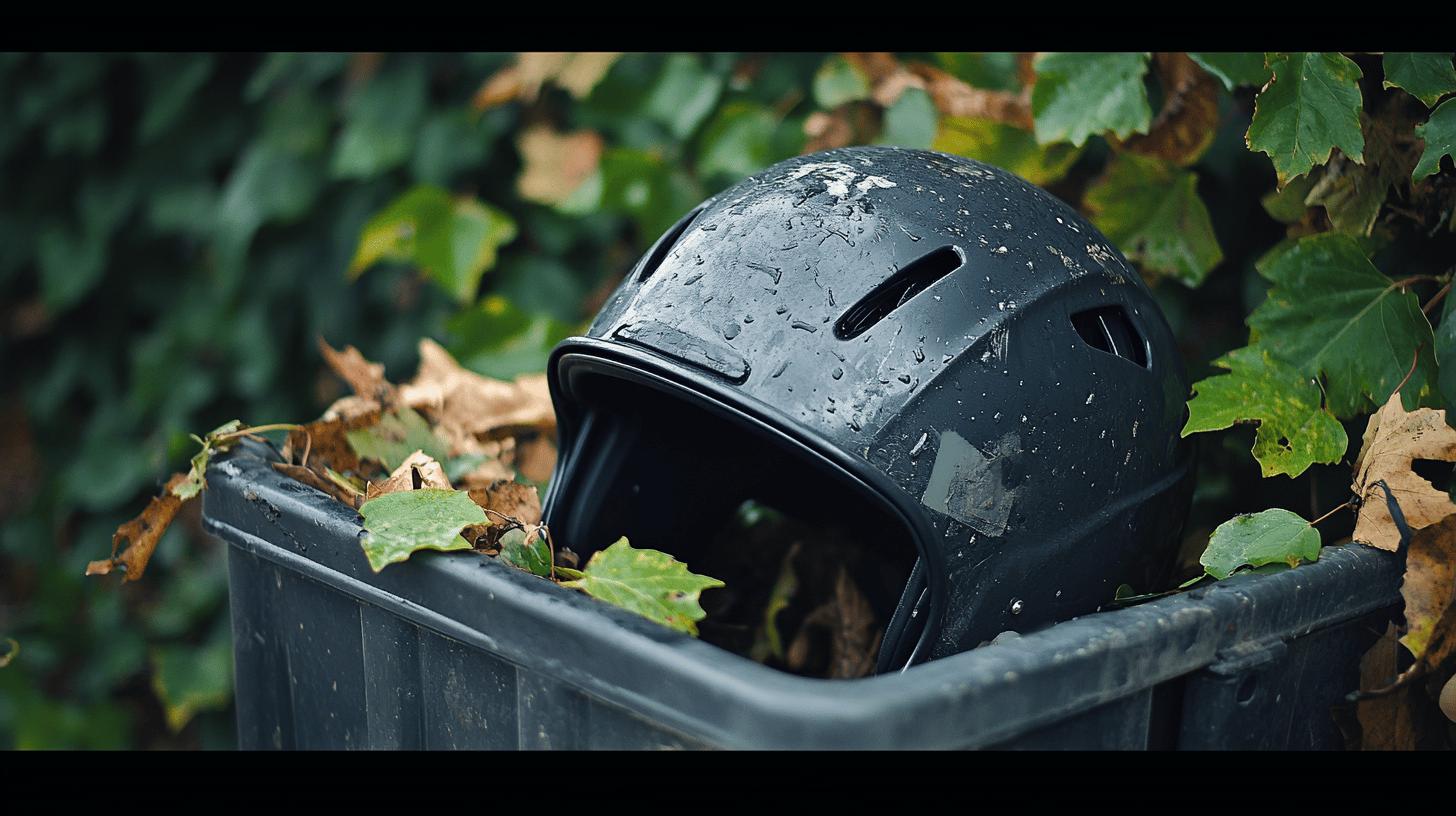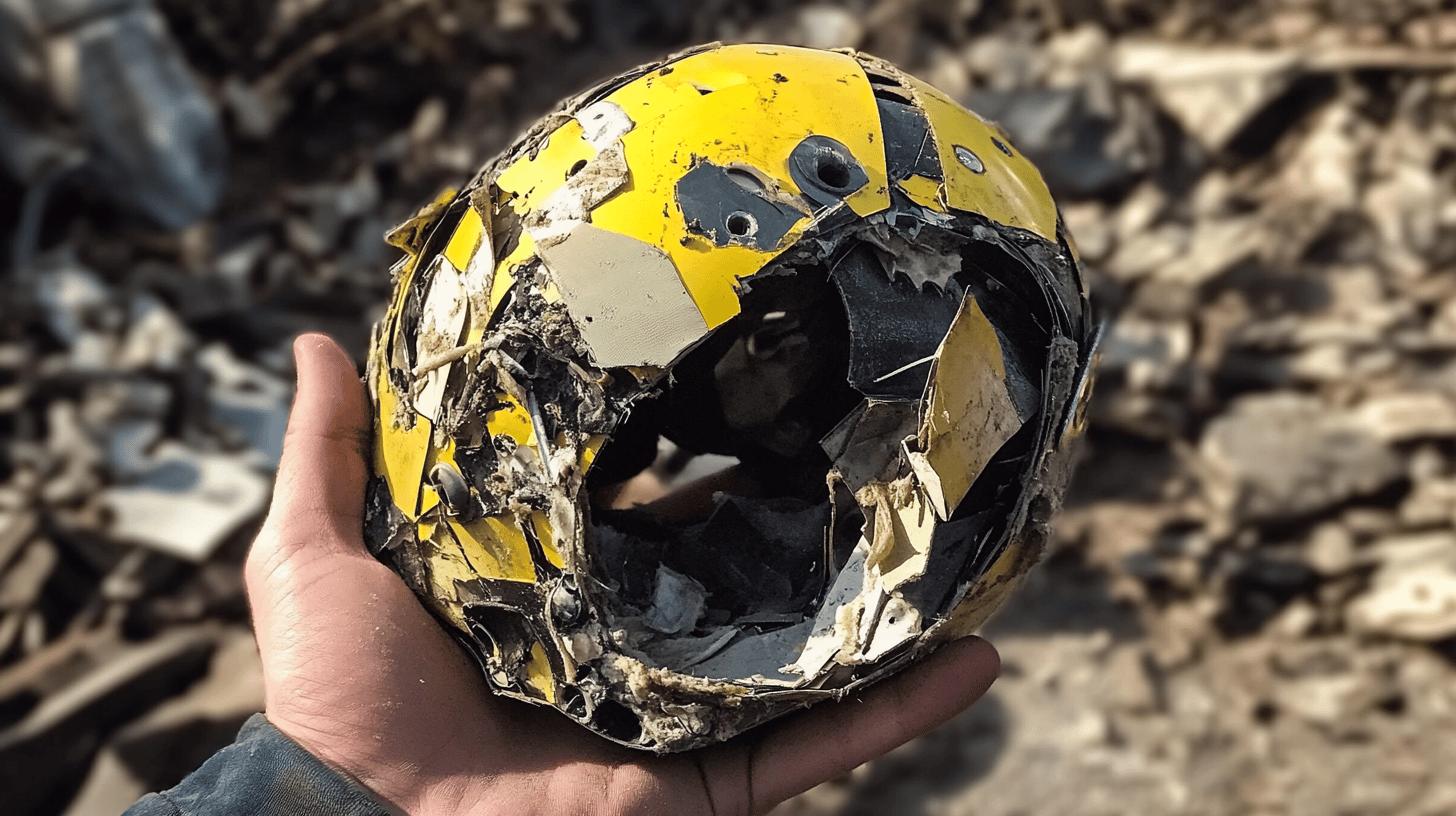Ever wondered what to do with old motorcycle helmets? Tossing them in the garbage can contribute to environmental issues, but recycling is not as straightforward as it seems.
Many local recycling centers have specific guidelines, and finding one that accepts helmets can feel like a maze. This article navigates the recycling landscape to help you locate centers willing to take your helmet.
Discover the steps needed to ensure responsible disposal and explore eco-friendly alternatives to keep your rides green and your conscience at ease.
Finding Local Recycling Centers for Motorcycle Helmets

Before dropping off your motorcycle helmet at a recycling center, it's crucial to verify their policies. Recycling motorcycle helmets can be challenging because of the complex materials used in their construction.
Local recycling centers might accept helmets, but the policies vary significantly by location. Some centers have specific guidelines regarding the materials they process, such as expanded polystyrene foam, which is not easily recyclable.
Therefore, contacting the facility beforehand ensures that your helmet will not be rejected upon arrival.
-
Steps to Find and Contact Local Recycling Centers:
-
Research Local Facilities: Start by searching for recycling centers near you that mention accepting motorcycle helmets.
-
Check Online Resources: Utilize online directories or local government websites for potential helmet drop-off points.
-
Contact Centers Directly: Call or email to confirm whether they accept helmets and any specific guidelines they have in place.
-
Inquire About Materials Accepted: Ask about the types of materials they can recycle to avoid unnecessary trips.
-
Verify Drop-off Procedures: Confirm the drop-off process, including operation hours and any required appointments.
Motorcycle helmets are typically composed of materials like Kevlar, polycarbonate, and expanded polystyrene foam. These materials pose significant recycling challenges due to their durability and the difficulty of separating them during processing.
Expanded polystyrene, in particular, is a concern as it's not widely accepted by many recycling programs. This complexity underscores the importance of knowing a center's capabilities and regulations. By understanding these limitations, riders can take proactive steps to recycle responsibly and reduce environmental impact.
Eco-Friendly Alternatives for Helmet Disposal

Disposing of motorcycle helmets in landfills is not recommended due to the environmental concerns associated with the materials used in their construction. Helmets are primarily composed of Kevlar and polycarbonate plastics, which do not break down easily and can remain in landfills for extended periods.
These materials are designed for durability and impact resistance, making them unsuitable for decomposition. Consequently, when helmets end up in landfills, they contribute to pollution and waste accumulation without offering any ecological benefits.
-
Alternative Eco-Friendly Disposal Methods:
-
Donation for Educational Use: Donate helmets to institutions or organizations for educational and training purposes.
-
Repurposing for Art Projects: Use helmets as canvases or structural components in creative art projects.
-
Manufacturer Take-Back Programs: Participate in manufacturer take-back programs where helmets are responsibly recycled or repurposed.
-
Specialized Recycling Services: Seek out specialized recycling services that handle complex materials like those found in helmets.
Improper disposal of helmets can have significant environmental repercussions. When helmets are not recycled or repurposed, they contribute to the growing problem of plastic waste.
The synthetic materials in helmets can release harmful chemicals into the soil and waterways if left to deteriorate in landfills. Such environmental hazards underscore the necessity for more sustainable disposal methods that minimize ecological damage.
Recycling helmet materials presents several challenges, primarily due to the complexity and durability of their components. The materials, including expanded polystyrene foam, are difficult to separate and process. These challenges often discourage standard recycling centers from accepting helmets.
This necessitates the need for specialized programs that can efficiently handle the breakdown and recovery of such materials, ensuring that the disposal process is both sustainable and environmentally conscious.
Repurposing Old Motorcycle Helmets: Creative Ideas

Repurposing old motorcycle helmets is an innovative way to breathe new life into gear that can no longer be used safely for riding. The materials used in helmet construction, such as Kevlar and polycarbonate, are durable and lend themselves well to a variety of creative projects.
By focusing on repurposing, riders can avoid contributing to landfill waste while crafting unique items from their old gear. This process not only helps in reducing environmental impact but also allows for personal expression and creativity.
Whether transformed into home decor or functional items, repurposed helmets offer a sustainable solution that keeps them out of the trash.
-
Creative Repurposing Ideas for Old Helmets:
-
Pet Beds: Remove the interior lining and cushion the shell to create a unique bed for small pets.
-
Planters: Drill drainage holes and fill the helmet with soil to use as a garden planter.
-
Birdhouses: Modify the helmet with an entrance for birds and hang it in the yard.
-
Art Pieces: Use the helmet as a canvas for painting or sculpting creative designs.
-
Lampshades: Convert the helmet into a lampshade by cutting an opening for the light fixture.
-
Bookends: Fill the helmet with a heavy material to use as sturdy bookends.
-
Wall Hangings: Mount the helmet on a wall as a decorative piece or memory display.
Exploring Helmet Construction
Deconstructing old helmets provides an opportunity to learn about their engineering and the materials involved. By taking apart a helmet, enthusiasts can gain insights into the layers and components that contribute to its protective capabilities.
This exploration not only satisfies curiosity but also highlights the technological advancements in helmet manufacturing. Understanding how helmets are made can enhance appreciation for their role in rider safety and inspire further innovation in personal projects.
Repurposing helmets not only offers a creative outlet but also contributes to sustainability by reducing waste. These projects minimize the environmental footprint of discarded helmets and promote mindful consumption.
By finding new uses for old gear, riders can actively participate in eco-friendly practices while showcasing their individuality. Embracing the potential of repurposing supports a circular economy and encourages others to think creatively about waste management.
Donation Opportunities for Motorcycle Helmets

Donating motorcycle helmets to educational and training facilities offers multiple benefits. These institutions often use helmets for safety demonstrations, allowing trainees to understand the importance of protective gear through hands-on experience.
Helmets donated to rider training facilities can be used to educate new riders on proper helmet use and care, enhancing their safety awareness. Furthermore, local police and fire departments may utilize helmets in community outreach programs, promoting road safety and demonstrating the critical role helmets play in accident prevention.
-
Potential Organizations for Helmet Donations:
-
Educational Institutions: Schools or colleges offering automotive or mechanical courses.
-
Rider Training Facilities: Motorcycle safety courses and training centers.
- Local Police and Fire Departments: For use in safety demonstrations and community programs.
Donations significantly contribute to safety education and awareness, providing tangible resources for instructional purposes. By donating helmets, individuals support these organizations in their mission to enhance public safety and instill a culture of responsible riding.
Helmets used in educational settings help illustrate real-world scenarios, making safety training more effective. Such contributions not only extend the life of helmets beyond their primary use but also foster a community-oriented approach to road safety.
Understanding the Recycling Process for Helmet Materials

Motorcycle helmets are primarily constructed from durable materials like Kevlar, polycarbonate, and expanded polystyrene foam. These materials are chosen for their impact resistance and protective capabilities, but they also present significant recycling challenges.
The complexity lies in the difficulty of separating these materials once bonded together, making standard recycling practices unsuitable. Expanded polystyrene foam, in particular, is not widely accepted in conventional recycling centers due to its low density and high processing requirements.
Consequently, finding appropriate recycling solutions for helmets requires understanding these challenges and seeking specialized options.
-
Steps Involved in the Recycling Process:
-
Material Identification: Determine the types of materials used in the helmet to assess recycling feasibility.
-
Disassembly: Carefully disassemble the helmet to separate components, focusing on dismantling the shell and liner.
-
Sorting and Cleaning: Sort the materials by type and clean them to remove contaminants that could interfere with recycling.
-
Material Processing: Send the separated materials to specialized facilities equipped to process and recycle them efficiently.
Specialized recycling programs play a crucial role in the recovery of helmet materials. These programs are designed to handle the intricate processes required to break down and recycle the diverse components found in helmets.
By focusing on advanced separation techniques and material-specific recycling methods, they offer a sustainable solution for managing helmet waste. These programs often collaborate with manufacturers and recycling facilities to ensure that as much material as possible is recovered and repurposed, contributing to a more circular economy.
Manufacturers can provide valuable assistance in the recycling process by offering guidance and resources. Many helmet manufacturers have established take-back programs or provide information on how to recycle their products responsibly.
Engaging with manufacturers can reveal additional options for helmet disposal, such as direct recycling initiatives or partnerships with specialized programs. By leveraging manufacturer expertise, riders can navigate the complexities of helmet recycling more effectively, ensuring that their gear is disposed of in an environmentally conscious manner.
Final Words
Exploring where to recycle motorcycle helmets opens opportunities to protect our environment. From verifying local recycling guidelines to creatively repurposing old helmets, each step contributes to sustainable disposal.
Eco-friendly methods, donation opportunities, and understanding material recycling processes can transform waste into valuable resources. Seeking alternatives to landfill disposal not only preserves the earth but ensures continued enjoyment of riding adventures.
Embrace the challenge to recycle responsibly and enhance the riding experience for all.
FAQ
Where can I recycle motorcycle helmets near me?
Recycling motorcycle helmets involves checking local recycling centers for material acceptance policies, as these vary. It's crucial to contact centers in advance to determine if they handle helmet materials like expanded polystyrene foam.
What should I do with my old motorcycle helmet?
Used motorcycle helmets can be repurposed creatively into items like pet beds, planters, or art pieces. Recycling challenges exist due to single-use designs, but innovative repurposing offers a practical second life.
How do I dispose of motorcycle helmets in California?
In California, consult local recycling centers for helmet disposal guidelines. Ensure they accept helmet materials by verifying their policies beforehand. Proper disposal helps avoid environmental harm.
How can I find a motorcycle helmet trade-in option?
Some retailers might offer trade-in programs for motorcycle helmets. Contact local dealers to inquire about current offers, as trade-in availability can vary widely across locations and stores.
Does Goodwill accept motorcycle helmets?
Goodwill generally does not accept motorcycle helmets due to safety and liability concerns. It's advisable to contact local branches to confirm specific donation policies for helmets.
What are some eco-friendly alternatives for helmet disposal?
Reduce environmental impact by opting for eco-friendly methods: donate to educational programs, repurpose creatively, find specialized recycling programs, and avoid landfill disposal due to harmful degradation.
Who buys used motorcycle helmets near me?
Finding buyers for used helmets can be challenging because of safety concerns. Consider donating them for educational purposes to places like rider training centers or safety demonstration organizations.
How can I explore helmet construction through repurposing?
Deconstruct old helmets to study their materials and design for educational insights. This process enhances understanding of helmet manufacturing, encouraging sustainable awareness through hands-on exploration.

Ryan Thompson is a 35-year-old sport bike enthusiast known for his adventurous spirit. With years of weekend rides and exploring new roads, Ryan brings fresh insights and firsthand experience to ProtectiveGearz. His energetic approach and passion for the latest gear make him a trusted source for riders seeking up-to-date advice.



